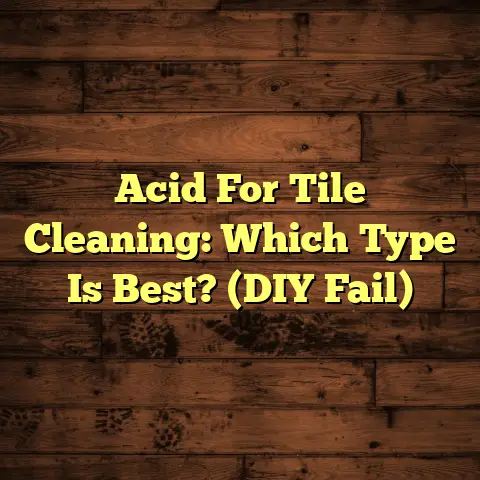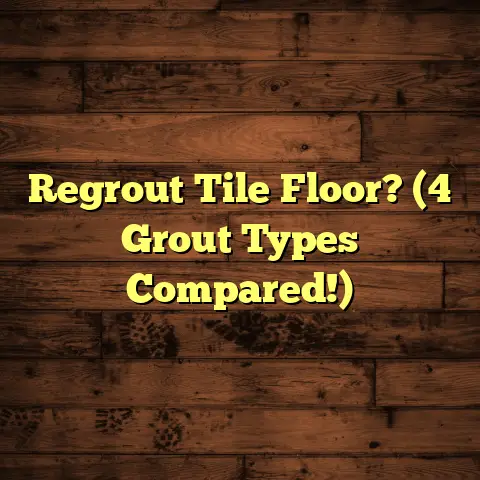Pet-Proof Vinyl Floors? (Top 5 Must-Haves!)
As a flooring contractor with years of experience, I’ve seen it all when it comes to pet-related flooring disasters. Trust me, choosing the right flooring when you have furry companions is crucial.
It’s not just about aesthetics; it’s about safety, durability, and your peace of mind. Let’s dive into why pet-proof vinyl flooring is a fantastic option and what “must-haves” you should be looking for.
Introduction: Prioritizing Safety
Let’s face it, our pets are family.
Their safety is paramount, right?
Traditional flooring options can pose risks. Think slippery tiles where your dog can’t get traction, or hardwood that splinters and hurts your cat’s paws.
I remember one client whose elderly dog slipped on their polished concrete floor and fractured a leg. It was heartbreaking!
Pets are prone to accidents – they’re playful, clumsy, and sometimes just plain unaware.
Certain flooring types can exacerbate these risks. Hard, unforgiving surfaces can lead to joint problems over time, especially in larger breeds.
That’s where vinyl flooring comes in.
It’s designed with safety in mind.
The textured surfaces offer better grip, minimizing slips and falls. Plus, it’s softer underfoot than tile or concrete, providing a bit of cushion.
Choosing the right flooring protects your pets and gives you peace of mind. No more constant worry about accidents!
According to the National Safety Council, falls are a leading cause of injury in homes. While they don’t specify pet-related falls, it’s safe to assume our furry friends contribute to the statistic.
Investing in pet-proof flooring is investing in your pet’s well-being and your own sanity.
Ready to explore the “must-haves?” Let’s go!
Section 1: Durability – Built to Last
Alright, let’s talk durability.
Pets, bless their hearts, can be tough on floors! Scratching, dragging toys, and the occasional “accident” – it all adds up.
Think about it: * Dogs’ nails are like tiny chisels, constantly scraping against the surface. * Cats, while graceful, can still leave scratches during their zoomies.
You need flooring that can withstand the daily onslaught. Vinyl flooring comes in various types, each with different durability levels.
- Sheet Vinyl: Typically the most affordable, but can be susceptible to tears and punctures.
- Vinyl Tile: Offers more durability than sheet vinyl, especially if you choose a thicker tile.
- Luxury Vinyl Plank (LVP) & Luxury Vinyl Tile (LVT): These are the heavy hitters of the vinyl world. They boast thicker wear layers and are designed to mimic the look of hardwood or stone while offering superior durability.
The wear layer is key.
It’s the top protective layer that shields the flooring from scratches, stains, and wear.
The thicker the wear layer (measured in mils), the more durable the flooring.
For homes with pets, I always recommend a wear layer of at least 20 mils.
How does vinyl compare to other options?
| Flooring Type | Durability (Pet-Related) |
|---|---|
| Hardwood | Low (easily scratched) |
| Laminate | Medium (scratch-resistant |
| but susceptible to water | |
| damage) | |
| Tile | High (but can be slippery) |
| Vinyl (LVP/LVT) | Very High |
As you can see, vinyl, especially LVP and LVT, offers excellent durability in pet-friendly homes.
When assessing durability, pay attention to: * Wear Layer Thickness: As mentioned, aim for at least 20 mils. * Core Construction: A dense, rigid core will resist dents and impacts. * Warranty: A longer warranty often indicates higher quality and durability.
I’ve had great success with brands like * Coretec * Shaw Floorté * **Armstrong Vivero
These brands are known for their durable, pet-friendly vinyl options.
Pro Tip: Don’t be afraid to ask for samples and test them! Try scratching them with a key or coin (gently, of course!) to see how they hold up.
Choosing durable vinyl flooring is an investment that will save you money and headaches in the long run.
Section 2: Scratch Resistance – Keeping It Pristine
Let’s be honest, no one wants a floor that looks like it’s been attacked by a tiny, furry army.
Scratch resistance is essential when you have pets.
Even well-groomed pets can leave scratches over time.
Those little claws are surprisingly sharp!
The good news is that many vinyl flooring options are specifically designed to resist scratches.
The secret lies in the topcoat.
Scratch-resistant vinyl flooring often features a special topcoat made of materials like: * Ceramic Beads: These add hardness and abrasion resistance. * UV Acrylic: This provides a tough, protective layer that resists scratches and fading.
The texture of the vinyl also plays a role.
Embossed textures can help to hide minor scratches better than smooth, glossy surfaces.
Think about it like this: a scratch on a smooth surface is highly visible, while a scratch on a textured surface blends in with the existing pattern.
Here’s a comparison:
| Finish | Scratch Resistance | Visibility of Scratches |
|---|---|---|
| Smooth, Glossy | Low | High |
| Embossed | Medium to High | Low |
| Textured (Wood) | High | Very Low |
I’ve seen some incredible products with proven scratch resistance. For example, * Mohawk SolidTech is known for its Ultimate Shield protection, which provides exceptional scratch and stain resistance. * Lifeproof at Home Depot consistently gets high marks for its scratch-resistant properties.
Don’t just take my word for it! Check out customer reviews and industry tests.
Websites like The Spruce and Good Housekeeping regularly test flooring for scratch resistance and other performance factors.
Regular maintenance is also crucial.
- Sweep or vacuum regularly to remove dirt and debris that can scratch the surface.
- Use a damp mop with a pH-neutral cleaner to remove spills and stains.
- Avoid using abrasive cleaners or scrub brushes, as these can damage the topcoat.
Pro Tip: Place mats at doorways to trap dirt and grit before they get tracked onto your floors.
Choosing scratch-resistant vinyl flooring and practicing good maintenance habits will keep your floors looking beautiful for years to come.
Section 3: Water Resistance – Bye-Bye, Accidents!
Okay, let’s talk about the elephant in the room: pet accidents.
It happens. No matter how well-trained your pet is, accidents are inevitable.
Spilled water bowls, muddy paws, and the occasional “oops” moment – it’s all part of pet ownership.
Water damage can wreak havoc on flooring.
It can lead to: * Stains * Odors * Mold and mildew growth * Warping and buckling
Vinyl flooring’s water-resistant properties are a lifesaver. It repels moisture, preventing it from penetrating the surface and causing damage.
But here’s the thing: there’s a difference between water-resistant and waterproof.
- Water-resistant flooring can withstand splashes and spills for a limited time. If you clean up the mess promptly, you’re usually in the clear.
- Waterproof flooring is completely impervious to water. It can handle standing water for extended periods without damage.
For pet owners, waterproof vinyl is the ideal choice.
It provides maximum protection against accidents and spills. Look for vinyl flooring with a waterproof core, such as WPC (wood-plastic composite) or SPC (stone-plastic composite).
These cores are incredibly dense and resistant to moisture.
Choosing the right product depends on your lifestyle.
- Do you have a puppy who’s still learning the ropes? Waterproof is a must!
- Do you have an older dog with occasional accidents? Waterproof is still a good idea.
- Are you meticulous about cleaning up spills immediately? Water-resistant might suffice, but waterproof offers extra peace of mind.
Installation techniques also enhance water resistance.
- Proper Sealing: Make sure all seams and edges are properly sealed to prevent water from seeping underneath the flooring.
- Underlayment: Choose a waterproof underlayment to provide an extra layer of protection against moisture.
Pro Tip: If you have a pet accident, clean it up immediately! The longer it sits, the greater the risk of staining or odor absorption.
Waterproof vinyl flooring is a game-changer for pet owners. It provides the ultimate protection against accidents and spills, keeping your floors looking and smelling fresh.
Section 4: Easy Maintenance – Less Work, More Play
Let’s be real, who wants to spend hours cleaning floors when they could be playing with their pets?
Easy maintenance is a must-have for pet owners.
Think about all the messes pets can create: * Shedding fur * Muddy paw prints * Food and water spills * The occasional “mystery” mess
You need flooring that’s easy to clean and maintain.
Vinyl flooring excels in this area.
It has a smooth, non-porous surface that resists stains and dirt.
Cleaning requirements are minimal: * Sweep or vacuum regularly: This removes loose fur, dirt, and debris. * Damp mop as needed: Use a pH-neutral cleaner to remove spills and stains. * Avoid harsh chemicals: These can damage the topcoat of the vinyl.
Compared to other flooring types, vinyl is a breeze to maintain.
| Flooring Type | Cleaning Requirements |
|---|---|
| Hardwood | Requires special cleaners, |
| avoid excessive moisture | |
| Laminate | Can be damaged by |
| excessive moisture | |
| Tile | Grout can be difficult |
| to clean | |
| Vinyl | Easy to clean with |
| simple cleaners |
Here’s a step-by-step guide to cleaning pet-related messes from vinyl floors:
- Blot up spills immediately: Use a clean cloth or paper towel to absorb as much liquid as possible.
- Clean the area with a damp mop: Use a pH-neutral cleaner diluted in water.
- Rinse with clean water: This removes any soap residue.
- Dry the area with a clean cloth: This prevents water spots.
For stubborn stains, try a solution of baking soda and water. Apply the paste to the stain, let it sit for a few minutes, and then wipe it away with a damp cloth.
The smooth surface of vinyl allows for quick and thorough cleaning.
No more scrubbing grout lines or worrying about water seeping into cracks!
Pro Tip: Invest in a good quality vacuum cleaner with a pet hair attachment. This will make it much easier to remove fur from your floors.
Choosing easy-to-maintain vinyl flooring frees up your time so you can spend more quality time with your furry friends.
Section 5: Comfort and Noise Reduction – Happy Pets, Happy Home
Finally, let’s talk about comfort and noise reduction.
These are often overlooked, but they’re important factors to consider when choosing flooring for pets.
Vinyl flooring can provide a more comfortable surface for pets to walk and play on.
It’s softer underfoot than tile or concrete, reducing the strain on their joints.
This is especially important for older pets or pets with arthritis.
The sound-dampening qualities of vinyl are also a major plus.
Pets can be noisy!
Think about: * Clicking nails on hard surfaces * Barking and howling * The sound of toys being dragged across the floor
Vinyl flooring can help to minimize these noises, making your home a more peaceful place.
Different underlayments and flooring types can enhance comfort and noise reduction.
- Thicker Vinyl: Provides more cushioning and sound absorption.
- Foam Underlayment: Adds extra padding and reduces noise transmission.
- Cork Underlayment: Offers excellent sound insulation and is also eco-friendly.
I’ve heard countless testimonials from pet owners who have experienced the benefits of comfort and reduced noise with vinyl flooring.
One client told me that her dog used to avoid walking on the tile floor because it was too cold and hard. After installing vinyl flooring, he started spending more time in that room and seemed much happier.
Another client said that the vinyl flooring significantly reduced the noise from her dog’s barking, making her apartment a more pleasant place to live.
Pro Tip: Consider adding area rugs or mats to provide extra comfort and noise reduction in high-traffic areas.
Choosing comfortable and noise-reducing vinyl flooring creates a more enjoyable environment for both you and your pets.
Conclusion: The Ultimate Pet-Friendly Flooring
So there you have it: the top 5 must-haves for pet-proof vinyl flooring.
Let’s recap: 1. Durability: Choose vinyl with a thick wear layer and a rigid core to withstand pet-related wear and tear. 2. Scratch Resistance: Look for vinyl with a scratch-resistant topcoat and a textured surface to minimize the appearance of scratches. 3. Water Resistance: Opt for waterproof vinyl to protect against accidents and spills. 4. Easy Maintenance: Choose vinyl that’s easy to clean and maintain, so you can spend less time cleaning and more time playing with your pets. 5. Comfort and Noise Reduction: Consider vinyl that provides a comfortable surface for pets to walk on and reduces noise transmission.
Pet-proof vinyl flooring is not just a practical choice; it’s a smart investment for pet owners.
It creates a safe, durable, and enjoyable environment for both pets and their owners.
Remember to consider your specific needs and preferences when selecting flooring.
Think about: * Your pet’s size and activity level * Your lifestyle and cleaning habits * Your budget
Choosing the right pet-proof vinyl flooring will provide long-term benefits, including: * Reduced risk of accidents and injuries * Protection against damage and stains * Easy maintenance and cleaning * A more comfortable and peaceful home
So go ahead, give your pets the gift of safe, comfortable, and beautiful flooring. You’ll both be glad you did!





